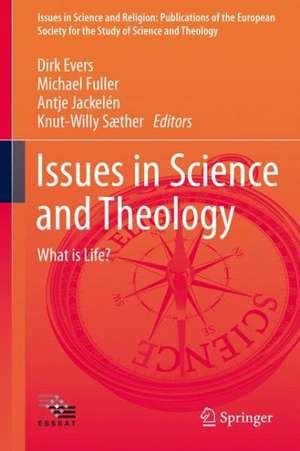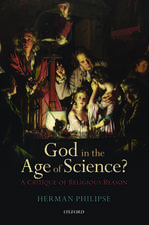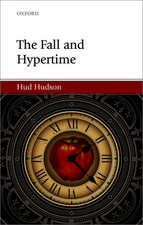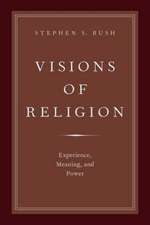Issues in Science and Theology: What is Life?: Issues in Science and Religion: Publications of the European Society for the Study of Science and Theology
Editat de Dirk Evers, Michael Fuller, Antje Jackelén, Knut-Willy Sætheren Limba Engleză Hardback – 24 iun 2015
| Toate formatele și edițiile | Preț | Express |
|---|---|---|
| Paperback (1) | 383.71 lei 6-8 săpt. | |
| Springer International Publishing – 17 oct 2016 | 383.71 lei 6-8 săpt. | |
| Hardback (1) | 391.02 lei 6-8 săpt. | |
| Springer International Publishing – 24 iun 2015 | 391.02 lei 6-8 săpt. |
Preț: 391.02 lei
Nou
Puncte Express: 587
Preț estimativ în valută:
74.83€ • 77.92$ • 63.24£
74.83€ • 77.92$ • 63.24£
Carte tipărită la comandă
Livrare economică 07-21 martie
Preluare comenzi: 021 569.72.76
Specificații
ISBN-13: 9783319174068
ISBN-10: 3319174061
Pagini: 207
Ilustrații: XI, 207 p. 1 illus.
Dimensiuni: 155 x 235 x 17 mm
Greutate: 0.49 kg
Ediția:2015
Editura: Springer International Publishing
Colecția Springer
Seria Issues in Science and Religion: Publications of the European Society for the Study of Science and Theology
Locul publicării:Cham, Switzerland
ISBN-10: 3319174061
Pagini: 207
Ilustrații: XI, 207 p. 1 illus.
Dimensiuni: 155 x 235 x 17 mm
Greutate: 0.49 kg
Ediția:2015
Editura: Springer International Publishing
Colecția Springer
Seria Issues in Science and Religion: Publications of the European Society for the Study of Science and Theology
Locul publicării:Cham, Switzerland
Public țintă
ResearchCuprins
Part I: From Physics to Biology.- Chapter 1: From Physics to Semiotics.- Chapter 2: Is Life Essentially Semiosis? A Commentary.- Chapter 3: Life in the open air.- Chapter 4: Reflections on Life: Lessons from Evolutionary Biology with Insights from Sergius Bulgakov.- Chapter 5: Life in Terms of Nano-Biotechnologies.- Part II: Concepts of Life in Philosophy, Theology and Ethics.- Chapter 6: Life: an Ill-defined Relationship.- Chapter 7: Emergence, Realism, and the Good Life.- Chapter 8: Dust of the Ground and Breath of Life (Gen. 2:7): The notion of ‘life’ in ancient Israel and emergence theory.- Chapter 9: The Openness of Life: Personhood and Faith – An Infinitizer Approach.- Chapter 10: Respect for Life in the Age of Science.- Part III: The Hermeneutics of Life.- Chapter 11: Life and Consciousness: Is there a biological foundation for consciousness?.- Chapter 12: “To Research Living Beings, One Has to Participate in Life”.- Chapter 13: Signs, Science, and Religion: A Biosemiotic Mediation.- Chapter 14: Persons Knowing Life: Theological Possibilities in Michael Polanyi’s Philosophy.- Chapter 15: Life Beyond Critical Realism. Developing Huyssteen’s Transversal Approach to the Science/Theology Dialogue.- Index.
Notă biografică
Dirk Evers is Professor for Dogmatics and Philosophy of Religion at Martin-Luther-University Halle-Wittenberg, Germany. Before joining Halle University in 2010 as a faculty member, he worked as assistant professor at Tübingen University under Eberhard Jüngel. Since his doctoral thesis on cosmology and doctrine of creation in 2000 he has been doing interdisciplinary work at the intersection of science and theology. He is trying to overcome traditional dichotomies by applying hermeneutical perspectives to the dialogue between science, the humanities and theology. Since 2014 he is president of ESSSAT (European Society for the Study of Science and Theology), and he is managing editor of the journal Philosophy, Theology, and the Sciences. Michael Fuller is a Fellow of New College at the University of Edinburgh. He studied Chemistry at the University of Oxford, where he was awarded a doctorate, and Theology at the University of Cambridge. He is an ordained Anglican priest, has served in churches in the dioceses of Oxford and Edinburgh, and is a Canon of St Mary’s Cathedral, Edinburgh. For 14 years he ran the training programmes for those entering ministry in the Scottish Episcopal Church. He is the author and editor of a number of books and articles relating to the interactions of science and theology, and also relating to theological themes in literature and music. His research work focusses on contemporary theological apologetics. He is Chair of the Science and Religion Forum, and Vice-President for Publications of the European Society for the Study of Science and Theology.
Textul de pe ultima copertă
This book explores the concept of Life from a range of perspectives. Divided into three parts, it first examines the concept of Life from physics to biology. It then presents insights on the concept from the perspectives of philosophy, theology, and ethics. The book concludes with chapters on the hermeneutics of Life, and pays special attention to the Biosemiotics approach to the concept. The question ‘What is Life?’ has been deliberated by the greatest minds throughout human history. Life as we know it is not a substance or fundamental property, but a complex process. It is not an easy task to develop an unequivocal approach towards Life combining scientific, semiotic, philosophical, theological, and ethical perspectives. In its combination of these perspectives, and its wide-ranging scope, this book opens up levels and identifies issues which can serve as intersections for meaningful interdisciplinary discussions of Life in its different aspects. The book includes the four plenary lectures and selected, revised and extended papers from workshops of the 14th European Conference on Science and Theology (ECST XIV) held in Tartu, Estonia, April 2012.
Caracteristici
Brings together leading international scholars from the fields of science, theology and philosophy Offers a radically interdisciplinary approach to the most basic of questions: “What is Life?” Inaugurates the ‘Issues in Science and Religion’ series between Springer and the European Society for the Study of Science and Theology Includes supplementary material: sn.pub/extras


















